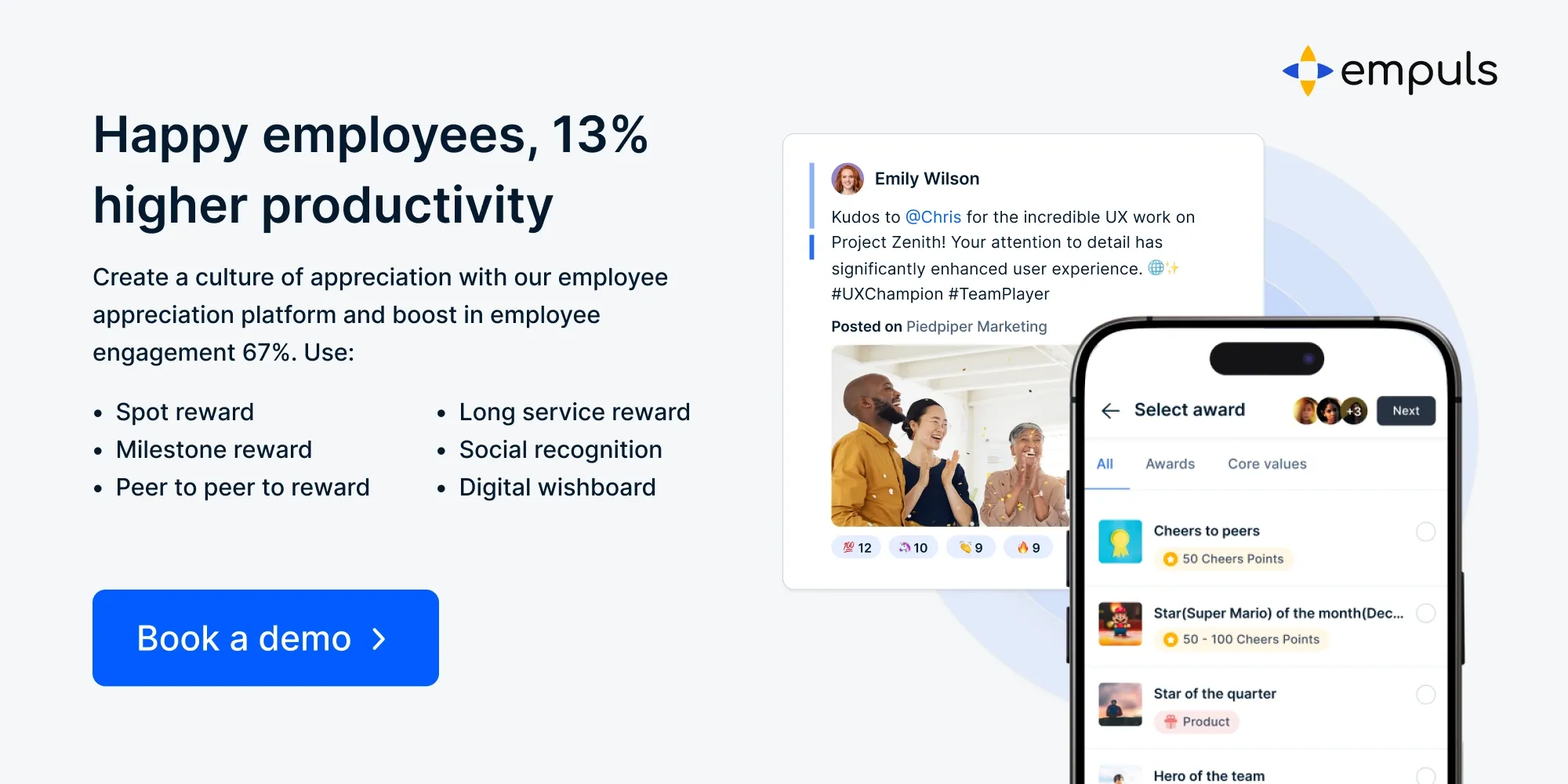25 idee di apprezzamento per i dipendenti che vi faranno distinguere nel 2025
Scoprite 25 idee di apprezzamento per i dipendenti che vi aiuteranno a migliorare il morale, a motivare il vostro team e a promuovere una cultura del lavoro positiva per il successo dell'organizzazione nel 2025.
In questa pagina
Mostrare apprezzamento ai propri dipendenti è il modo più economico e d'impatto per farli sentire apprezzati e motivati Anche le idee e i gesti più semplici di apprezzamento dei dipendenti possono avvicinare i team e i canali, sollevare il morale e amplificare la produttività. Esprimere gratitudine per i dipendenti è un modo fondamentale per incoraggiare il vostro team a crescere, ma solo se sapete come farlo.
Riconoscere e valorizzare il duro lavoro e la dedizione dei membri del team non solo aumenta il morale, ma anche la produttività e la fedeltà.
Abbiamo raccolto una serie di idee innovative e sentite per aiutare i dipendenti a coltivare un ambiente di lavoro positivo e a dimostrare loro quanto sono apprezzati.
20 idee semplici e creative per dimostrare l'apprezzamento dei dipendenti sul posto di lavoro
Ecco alcuni modi semplici e creativi per dimostrare ai vostri dipendenti che ci tenete e farli sentire riconosciuti e apprezzati. riconosciuti e apprezzati-
1. Passare di frequente
Un semplice "Come va?" o "Tutto bene?" quando si arriva al lavoro la mattina può spesso essere sufficiente per far sentire i lavoratori riconosciuti e sollevati. All'inizio può sembrare un'incombenza (soprattutto se non fa parte della cultura), ma la cosa positiva è che questa sensazione si trasformerà presto in una piacevole abitudine che i dipendenti apprezzeranno ogni giorno.
I dipendenti affermano in alcuni studi che questo semplice gesto può avere per loro lo stesso significato di un riconoscimento formale. Inoltre, questo gesto funge da "strumento di ascolto sociale" e "sondaggio sull'umore" per i leader, aiutando i supervisori a rimanere al corrente di tutto ciò che accade in caserma.
2. Trasformare i compiti quotidiani in missioni magiche (ogni volta che si può).
Un promemoria o un'e-mail di regolamentazione sono stimolanti quanto una connessione Internet lenta o l'ascolto del discorso di un politico. Quindi, quando state per distribuire "l'ennesimo brief normativo" che presenta gli stessi compiti e le stesse richieste, fermatevi.
Dite al collaboratore perché l'incarico è stato affidato proprio a lui e non a qualcun altro. Ad esempio, hanno fatto un ottimo lavoro l'ultima volta o, secondo voi, nessuno può rendere maggiore giustizia allo spirito del progetto.
Dimostrate loro che la loro opinione sul compito è molto importante chiedendo quanto tempo pensano di avere bisogno. Scoprite se hanno bisogno di aiuto o di mani in più. E ricordate loro che possono rivolgersi a voi in qualsiasi momento per avere supporto.
Non solo avete dato al progetto un inizio davvero eccellente, ma avete anche sollevato il morale per garantire un risultato migliore e forse vi siete guadagnati un buon amico.
3. Condividere feedback positivi
Una buona parola da parte dello stesso capo, anche se necessaria ed eccellente, può diventare prevedibile (o, peggio, sembrare una "messa in scena") dopo un po'. Cercate di individuare menzioni positive anche da altre fonti, come colleghi, clienti, canali e reti estese. Se qualcuno ha apprezzato un membro del team in una mail o in un messaggio di testo, siate rapidi nel trasmetterlo.
In ogni caso, comunicando che il lavoratore ha un impatto genuino, avete regalato all'ego un delizioso massaggio (non ne abbiamo tutti bisogno, a volte), che si rifletterà sicuramente sull'atmosfera, sulla mentalità e, sì, anche sulla qualità del lavoro.
4. Lanciare una sfida
Il posto di lavoro non è una fabbrica di droni presidiata da cloni. Non è un luogo in cui si timbra un numero fisso di ore facendo esattamente quello che si è fatto ieri. Nel migliore dei casi, è un parco giochi in cui dobbiamo essere costantemente stuzzicati per far emergere i nostri talenti nascosti, per superare il nostro peso ogni tanto e per provare il brivido di provare "cose nuove".
Lasciate che siano i vostri dipendenti a fare tutto questo. Sebbene i compiti più umili e le routine poco brillanti debbano rimanere il pane quotidiano di un'azienda, tenete gli occhi aperti per individuare le opportunità di rendere più vivaci le "cose difficili".
Per esempio, si può inserire un nuovo punto di vista o un KPI, oppure lasciare che i dipendenti applichino il loro talento in un reparto diverso o in una funzione laterale. In questo modo non solo si rende piacevole la giornata lavorativa, ma si permette al lavoratore di imparare qualcosa di nuovo, di ampliare le proprie competenze e di contribuire al risultato dell'azienda in modi unici e nuovi.
5. Riconoscere e premiare
L'apprezzamento e il riconoscimento dei dipendenti giocano un ruolo fondamentale nel determinare la felicità e l'impegno dei dipendenti. Tanto che i dipendenti felici sono, in media, più produttivi del 12% rispetto ai loro colleghi meno felici. ricerca.
Quando pensate di riempire i vostri dipendenti di ovazioni e riconoscimenti in forma tangibile (incentivi), come premi e regali, ci sono alcune regole empiriche da tenere a mente. Innanzitutto, fatelo il prima possibile, prima che l'atmosfera si raffreddi, in modo da poter sfruttare la "magia del momento". Un incentivo ritardato, dopo tutto, è un incentivo negato. L'altra è quella di personalizzarlo.
L'implementazione di un programma di riconoscimento formale può fornire un modo strutturato per riconoscere e premiare le prestazioni eccezionali. Si può trattare di premi mensili o trimestrali per i risultati eccezionali, di programmi di riconoscimento tra pari o di un "Wall of Fame" in cui i risultati ottenuti dai dipendenti vengono esposti in modo visibile.
Assicuratevi che il regalo o l'incentivo sia all'altezza dell'occasione. Un top performer, come un agente immobiliare che vende una villa, merita di più di un buono pizza, e un manager che approda a una categoria VIP si aspetta di più di un taglio di capelli gratuito. Quando scegliete i premi, siate riflessivi e significativi.
6. Utilizzare biglietti di ringraziamento personalizzati
Incoraggiate i membri del team a scrivere note di ringraziamento sentite ai loro colleghi, esprimendo il loro apprezzamento per azioni o contributi specifici. Questi biglietti possono essere scritti a mano o in formato digitale e possono essere esposti in un'area comune o condivisi in forma anonima per diffondere positività e riconoscimento in tutto il team.
7. Opzioni di lavoro flessibili
Offrite ai dipendenti la possibilità di avere un "giorno flessibile" o un "orario flessibile" in cui possono scegliere di lavorare da casa, modificare il proprio orario o prendersi una mezza giornata di riposo come segno di apprezzamento per il loro duro lavoro e la loro dedizione.
La flessibilità negli accordi di lavoro dimostra fiducia e consente ai dipendenti di conciliare meglio la vita lavorativa e quella personale, con conseguente aumento della soddisfazione e della produttività.
8. Opportunità di sviluppo professionale
Investire nella crescita professionale dei vostri dipendenti è un modo efficace per dimostrare il vostro apprezzamento per la loro dedizione e il loro impegno. Offrite opportunità di sviluppo delle competenze attraverso workshop, seminari o corsi online.
Opportunità di apprendimento opportunità di apprendimento e sviluppo personalizzate che rispondono ai loro interessi individuali e ai loro obiettivi di carriera possono dimostrare il vostro impegno per il loro avanzamento di carriera e la loro crescita personale, favorendo un senso di lealtà e di apprezzamento tra i membri del vostro team.
9. Laboratori di sviluppo delle competenze
Offrire ai dipendenti l'opportunità di migliorare le loro competenze professionali e il loro sviluppo personale attraverso workshop o sessioni di formazione. Queste possono spaziare dalle competenze tecniche rilevanti per il loro ruolo lavorativo alle soft skills come la comunicazione, la leadership o la gestione del tempo.
Investire nella crescita dei dipendenti non solo dimostra l'apprezzamento per la loro dedizione, ma li aiuta anche a fare carriera.
10. Programma di riconoscimento tra pari
Stabilire un programma di riconoscimento tra pari I dipendenti possono nominare i loro colleghi che si sono distinti per prestazioni eccezionali, lavoro di squadra o per essere andati oltre le loro mansioni. I vincitori potrebbero ricevere un piccolo premio, un riconoscimento durante una riunione aziendale o un certificato di apprezzamento. Il riconoscimento tra pari favorisce una cultura lavorativa positiva basata sul sostegno, sul cameratismo e sull'apprezzamento reciproco.
11. Giornata del volontariato
Organizzate una giornata di volontariato a livello aziendale in cui i dipendenti si riuniscono per partecipare a un progetto di servizio alla comunità o per sostenere una causa benefica. In questo modo si promuove il lavoro di squadra e l'unità e si permette ai dipendenti di restituire alla comunitàche può essere un'esperienza profondamente appagante.
Considerate la possibilità di offrire permessi retribuiti per questa giornata di volontariato per dimostrare l'impegno dell'azienda verso la responsabilità sociale e il benessere dei dipendenti.
12. Iniziative di benessere
Promuovere il benessere dei dipendenti Offrendo iniziative di benessere come corsi di yoga o di meditazione, strutture di fitness in loco o iscrizioni a palestre sovvenzionate. Potete anche organizzare sfide di benessere o fornire risorse per la gestione dello stress e il supporto alla salute mentale.
Dimostrare di avere a cuore la salute e il benessere generale dei propri dipendenti dimostra un impegno genuino per la loro felicità e longevità all'interno dell'azienda.
13. Omaggi a sorpresa o vantaggi
Sorprendete il vostro team con offerte o vantaggi inaspettati per rallegrare la loro giornata e dimostrare il vostro apprezzamento. Ad esempio, si può portare la colazione o gli spuntini per il team, organizzare una festa del gelato a sorpresa o fornire buoni per il caffè o il pranzo presso i bar locali.
Piccoli gesti come questi possono far sentire i dipendenti valorizzati e apprezzati, favorendo un senso di cameratismo e positività all'interno del luogo di lavoro.
14. Regali personalizzati
Dimostrate il vostro apprezzamento con doni personalizzati e attenti agli interessi o agli hobby di ciascun dipendente. Ad esempio, oggetti come libri, gadget o accessori che si allineano con le loro passioni al di fuori del lavoro.
Dedicare del tempo alla scelta di un regalo significativo dimostra che apprezzate la loro individualità e i loro interessi, rafforzando il legame tra datore di lavoro e dipendente.
15. Riflettori puntati sui dipendenti
Presentate regolarmente i singoli dipendenti o i team in articoli di approfondimento sulla newsletter interna, sul sito web o sui canali dei social media della vostra azienda. Evidenziate i loro risultati, contributi e talenti unici, permettendo loro di brillare sotto i riflettori.
Questo riconoscimento non solo aumenta il loro morale, ma ispira anche gli altri a lottare per l'eccellenza e promuove una cultura di riconoscimento e apprezzamento in tutta l'organizzazione.
16. Celebrazioni di pietre miliari
Festeggiare le tappe significative nella vita personale e professionale dei dipendenti, come anniversari di lavoro, compleanni o eventi importanti della vita. Questo potrebbe comportare organizzare feste a sorpresadecorare il loro spazio di lavoro o consegnare loro regali personalizzati o attestati di stima.
Riconoscere questi traguardi dimostra che i dipendenti non sono solo lavoratori, ma individui con esperienze e contributi unici per il team.
17. Shoutout sulla social intranet dell'azienda
Un modo efficace per dimostrare l'apprezzamento per i vostri dipendenti è quello di dare loro un riconoscimento pubblico attraverso gli shoutout sulla social intranet aziendale. intranet sociale dell'azienda. Che si tratti di riconoscere un lavoro ben fatto su un progetto recente, di sottolineare il loro contributo a un lavoro di squadra di successo o semplicemente di elogiare il loro atteggiamento positivo e la loro etica lavorativa, gli shoutout pubblici possono contribuire in modo significativo ad aumentare il morale e la motivazione.
Non solo fa sentire i dipendenti valorizzati e apprezzati, ma incoraggia anche una cultura del riconoscimento e del cameratismo all'interno dell'organizzazione.
18. Inviate loro carte regalo
Un altro modo premuroso di esprimere il proprio apprezzamento per i dipendenti è quello di inviare loro delle carte regalo. Le carte regalo offrono flessibilità e permettono ai dipendenti di scegliere qualcosa che desiderano veramente, sia che si tratti di un pasto al ristorante preferito, di un giro di shopping presso il loro rivenditore preferito o di un'esperienza rilassante in una spa.
Le carte regalo consentono ai dipendenti di concedersi un regalo, mostrando gratitudine per il loro contributo. Che si tratti del raggiungimento di obiettivi, di un eccezionale lavoro di squadra o di un impegno superiore alle aspettative, sono un gesto di ringraziamento versatile e apprezzato.
19. Oggetti aziendali
Chi non ama gli lo swag aziendale? Fornire ai dipendenti articoli di marca come magliette, bottiglie d'acqua, borse o quaderni può essere un modo divertente ed efficace per dimostrare il loro apprezzamento per il duro lavoro e la loro fedeltà.
I gadget aziendali fanno sentire i dipendenti legati al team e servono a ricordare il loro legame con l'azienda. Inoltre, promuove una cultura positiva e stimola le conversazioni sia all'interno che all'esterno del luogo di lavoro.
20. Vantaggi aziendali esclusivi per far sentire i dipendenti apprezzati
Offerta esclusivi vantaggi aziendali è un altro modo fantastico per far sentire i dipendenti valorizzati e apprezzati. Dagli abbonamenti scontati alle palestre e ai programmi di benessere all'accesso a eventi ed esperienze esclusive, questi vantaggi vanno oltre i benefit tradizionali e creano un senso di appartenenza e apprezzamento all'interno dell'azienda.
Offrire ai dipendenti opportunità per arricchire la loro vita al di fuori del lavoro dimostra il vostro impegno nei confronti del loro benessere olistico e del loro sviluppo personale. Inoltre, i vantaggi esclusivi per l'azienda possono aiutare a attrarre e trattenere i migliori talentiposizionando la vostra organizzazione come datore di lavoro di prima scelta in un mercato competitivo.
Lettura consigliata: Settimana di apprezzamento dei dipendenti 2024: Idee di celebrazione per aumentare lo spirito di squadra e riconoscere le nostre rockstar

Idee per l'apprezzamento dei dipendenti in estate
L'estate è il momento perfetto per attuare iniziative di apprezzamento divertenti e coinvolgenti che abbiano una certa risonanza tra i dipendenti. Ecco alcune idee creative per celebrare il vostro team e mostrare loro quanto sono apprezzati:
1. Picnic di squadra all'aperto
Un picnic in un parco locale offre ai dipendenti un ambiente rilassato per creare un legame fuori dall'ufficio. Aggiungete attività divertenti come il frisbee o la caccia al tesoro, e offrite un pasto con catering o un piatto unico per dare un tocco personale. Posti a sedere comodi e un'atmosfera informale favoriscono relazioni più forti e un senso di comunità.
2. I venerdì d'estate
Offrire orari flessibili o permessi anticipati il venerdì d'estate è un ottimo modo per dimostrare il proprio apprezzamento. Permettere ai dipendenti di uscire qualche ora prima o di prendersi una mezza giornata permette loro di avere più tempo per godersi le attività estive, sia con la famiglia che in viaggio o semplicemente per rilassarsi. Questo gesto premuroso riconosce il loro duro lavoro e migliora la soddisfazione e l'equilibrio tra lavoro e vita privata.
3. Gelato sociale
Organizzate una giornata del gelato con una varietà di gusti e guarnizioni, permettendo ai dipendenti di creare la propria coppa. Questa pausa rinfrescante favorisce un'atmosfera celebrativa e l'aggiunta di attività divertenti come il quiz sul gelato può renderla ancora più piacevole.
4. Giornate del benessere
Organizzate attività incentrate sul benessere che promuovano la salute fisica e mentale. Organizzate sessioni di yoga, workshop di meditazione o corsi di fitness all'aperto adatti alla stagione calda per incoraggiare i dipendenti a dare priorità al loro benessere.
Potreste anche proporre delle sfide di benessere, in cui i dipendenti tengono traccia della loro attività fisica o della loro alimentazione sana per avere la possibilità di vincere dei premi.
5. Cesti regalo
Assemblate e distribuite cesti regalo a tema estivo per dimostrare l'apprezzamento per il duro lavoro dei vostri dipendenti. Scegliete cesti con un mix di leccornie, articoli per il benessere ed elementi essenziali per l'estate, come creme solari, snack, bottiglie d'acqua riutilizzabili o un biglietto personalizzato.
Le aziende che stanno facendo centro con i programmi di apprezzamento dei dipendenti
Ecco alcuni esempi di aziende con ottimi programmi di apprezzamento dei dipendenti.
1. GThanks di Google
Google ha un programma di riconoscimento peer-to-peer chiamato gThanks, che consente ai dipendenti di esprimere apprezzamento per i contributi dei colleghi. Questo programma consente ai dipendenti di inviare gettoni virtuali di apprezzamento, come badge digitali o messaggi personalizzati, per riconoscere gli sforzi e i risultati dei colleghi.
Il riconoscimento può riguardare qualsiasi cosa, dal completamento di un progetto impegnativo alla dimostrazione di un eccezionale lavoro di squadra o all'incarnazione dei valori aziendali.
Come funziona
- I dipendenti hanno accesso a una piattaforma dove possono facilmente inviare e ricevere gThanks.
- Ai dipendenti è stato assegnato un certo budget per assegnare i bonus ai loro colleghi.
- Ogni dipendente può nominare un altro per un bonus alla pari e un comitato esamina le candidature per garantire l'equità e l'allineamento con i valori aziendali.
- Una volta approvato, il dipendente nominato ha ricevuto un bonus in denaro come segno di apprezzamento per il suo eccellente lavoro.
- Questo programma riconosce i contributi individuali e promuove il lavoro di squadra e la collaborazione all'interno dei team.
- Il programma ha avuto un grande successo in Google, contribuendo a creare un ambiente di lavoro positivo e ad aumentare il coinvolgimento dei dipendenti.
- Implementando un programma simile di riconoscimento mensile tra pari, le aziende possono dare ai dipendenti la possibilità di apprezzare e riconoscere gli sforzi reciproci, con il risultato di una forza lavoro più motivata e impegnata.
- Google organizza occasionalmente eventi o riunioni in cui i dipendenti possono riconoscere e celebrare pubblicamente i risultati ottenuti dai loro colleghi.
Impatto: GThanks promuove una cultura di apprezzamento e cameratismo all'interno della forza lavoro di Google. Consentendo ai dipendenti di riconoscere i contributi degli altri, rafforza le relazioni, aumenta il morale e migliora il lavoro di squadra. Inoltre, il programma promuove un senso di appartenenza e di convalida, in quanto i dipendenti si sentono apprezzati e rispettati per i loro sforzi al di là delle tradizionali valutazioni delle prestazioni.
Risultato: Il programma gThanks di Google contribuisce ad aumentare il coinvolgimento e la fidelizzazione dei dipendenti. Crea un ambiente di lavoro positivo in cui i dipendenti si sentono apprezzati e motivati a dare il meglio di sé. Dando ai dipendenti la possibilità di riconoscere e celebrare i successi degli altri, Google coltiva una cultura dell'apprezzamento che si allinea ai suoi valori fondamentali di collaborazione, innovazione e inclusione.
2. Southwest Airlines
Southwest Airlines, la più grande compagnia aerea low-cost del mondo, si è costantemente guadagnata un posto nella lista dei migliori datori di lavoro d'America di Forbes, a testimonianza del suo costante impegno nei confronti dei dipendenti. Al centro del suo ethos incentrato sui dipendenti c'è l'innovativo programma di riconoscimento Southwest Airlines Gratitude (SWAG), che esemplifica la dedizione dell'azienda nel promuovere una cultura di apprezzamento e cameratismo tra i suoi dipendenti.
Premessa: Southwest Airlines, conosciuta come una "Compagnia di persone", ha coltivato la reputazione di dare priorità sia ai propri dipendenti che ai clienti. Con la sua sesta apparizione consecutiva nella lista dei migliori datori di lavoro d'America di Forbes nel 2021, Southwest Airlines continua a stabilire lo standard per la soddisfazione e il coinvolgimento dei dipendenti.
Panoramica del programma: Il programma di riconoscimento SWAG di Southwest Airlines è un'iniziativa peer-to-peer in cui i dipendenti hanno l'opportunità di riconoscersi e premiarsi a vicenda per contributi e atti di gentilezza eccezionali.
Le caratteristiche principali del programma SWAG includono:
- Riconoscimento a punti: I dipendenti possono assegnare punti SWAG ai loro colleghi come segno di apprezzamento per il loro impegno. Questi punti possono essere riscattati per ottenere vari premi, tra cui incentivi di viaggio come punti Rapid Rewards, pass per gli ospiti, merce, carte regalo e persino carte di debito Visa.
- Estrazioni a premi mensili: Per aggiungere un elemento di eccitazione e motivazione, i titolari di punti SWAG possono partecipare a estrazioni di premi mensili, fornendo un ulteriore incentivo per i dipendenti a partecipare attivamente al programma di riconoscimento.
- Nessuna data di scadenza: a differenza dei sistemi di ricompensa tradizionali, i punti SWAG di Southwest Airlines non hanno una data di scadenza, garantendo ai dipendenti la possibilità di accumulare punti nel tempo e di riscattarli a loro piacimento.
Efficacia
Il programma di riconoscimento dei dipendenti della Southwest Airlines, in particolare l'iniziativa SWAG, si è dimostrato molto efficace in diverse aree chiave:
- Promuovere una cultura dell'apprezzamento: Dando ai dipendenti la possibilità di riconoscersi e premiarsi a vicenda, il programma SWAG promuove una cultura di apprezzamento e rispetto reciproco all'interno dell'organizzazione. Ciò rafforza il morale dei dipendenti e migliora la soddisfazione lavorativa complessiva.
- Incentivazione di comportamenti positivi: La disponibilità di ricompense tangibili incentiva i dipendenti ad andare oltre il proprio ruolo, migliorando le prestazioni e la produttività dell'azienda.
- Costruire il coinvolgimento dei dipendenti: Il programma SWAG coinvolge attivamente i dipendenti nel processo di riconoscimento, promuovendo un senso di appartenenza e di coinvolgimento nei valori e negli obiettivi dell'azienda.
- Migliorare la fidelizzazione dei dipendenti: Dando priorità al riconoscimento e all'apprezzamento dei dipendenti, Southwest Airlines ne rafforza la fedeltà e riduce i tassi di turnover, risparmiando sui costi di assunzione e formazione.
Ulteriori iniziative di sostegno ai dipendenti: Oltre al programma SWAG, Southwest Airlines dimostra il suo impegno per il benessere dei dipendenti attraverso iniziative come l'SWA Family Fund. Questo programma fornisce assistenza finanziaria ai dipendenti che si trovano ad affrontare difficoltà impreviste, rafforzando l'etica dell'azienda di sostenere la propria forza lavoro nei momenti di difficoltà.
Conclusioni: Il programma di riconoscimento dei dipendenti di Southwest Airlines, incarnato dall'iniziativa SWAG, è una pietra miliare della sua rinomata cultura aziendale e della soddisfazione dei dipendenti. Dando ai dipendenti la possibilità di riconoscersi e premiarsi a vicenda, Southwest Airlines promuove un senso di apprezzamento, cameratismo e coinvolgimento che contribuisce al suo continuo successo come compagnia aerea leader del settore.
Sfruttare Empuls per l'apprezzamento dei dipendenti
Una cultura dell'apprezzamento consiste nel valorizzare i dipendenti come esseri umani e nel riconoscere il loro impatto sulla costruzione di un'organizzazione di successo. nella costruzione di un'organizzazione di successo. Si tratta di un'abitudine sul posto di lavoro che deve essere imposta dall'alto verso il basso dalla leadership.
Per portare le vostre iniziative di apprezzamento dei dipendenti a un livello superiore, prendete in considerazione l'integrazione di Empuls, una piattaforma innovativa progettata per migliorare il coinvolgimento attraverso premi e riconoscimenti. Empuls offre una suite completa di funzioni che possono semplificare le vostre iniziative di apprezzamento, rendendole più efficaci e d'impatto.

- Badge di riconoscimento: Create badge personalizzati come "Summer Star" o "Team Player" per motivare i dipendenti e celebrare i risultati ottenuti.
- Premi automatizzati: Semplificate la distribuzione dei premi spot e dei punti di riconoscimento per garantire un riconoscimento tempestivo, senza dover ricorrere a un ulteriore lavoro di amministrazione.
- Intranet sociale: Condividete annunci, riconoscete pubblicamente i dipendenti e incoraggiate il coinvolgimento dei team per promuovere la comunità e l'entusiasmo.
- Strumenti di feedback: Utilizzate indagini e sondaggi per raccogliere informazioni e migliorare le iniziative di apprezzamento in base alle preferenze dei dipendenti.
- Flussi di lavoro personalizzati: Personalizzate i processi di riconoscimento con i nominatori e gli approvatori per garantire equità e inclusione.
Empuls aiuta a costruire una cultura dell'apprezzamento, aumentando la motivazione e rafforzando i legami tra i dipendenti.
Domande frequenti
Quali sono le idee di apprezzamento divertenti per il lavoro?
Ecco alcune divertenti idee di apprezzamento per il lavoro:
- Uscite di squadra: Organizzare attività come il bowling o i picnic.
- Premi per l'ufficio: Organizzate una divertente cerimonia di premiazione con categorie creative.
- Pause di gioco: Offrite trivia o giochi da tavolo per divertirvi a metà giornata.
- Swag personalizzati: Regali personalizzati come tazze o magliette.
- Sorprese alla scrivania: Lasciate piccoli regali o biglietti di ringraziamento.
Come dimostrare l'apprezzamento del personale con un budget limitato?
Per dimostrare l'apprezzamento del personale con un budget limitato, offrite biglietti di ringraziamento scritti a mano, riconoscimenti verbali durante le riunioni, orari di lavoro flessibili, grida di gruppo, piccoli omaggi come snack o la creazione di un "Wall of Fame" per evidenziare i risultati ottenuti. Questi gesti premurosi sono molto utili senza costare molto.
Come posso far sentire i miei dipendenti apprezzati?
Fate in modo che i dipendenti si sentano apprezzati riconoscendo regolarmente i loro contributi, offrendo messaggi di ringraziamento personalizzati, festeggiando le tappe fondamentali, offrendo ricompense significative, sollecitando il loro feedback e promuovendo una cultura di sostegno e di inclusione sul posto di lavoro.
Come posso coinvolgere i dipendenti nel processo di pianificazione?
Coinvolgete i dipendenti nel processo di pianificazione chiedendo il loro contributo attraverso sondaggi, sessioni di brainstorming o riunioni di gruppo, assegnando loro ruoli nel processo decisionale e incoraggiando la collaborazione per garantire che le loro idee vengano ascoltate e attuate.
Cosa sono i badge di riconoscimento e come possono essere utilizzati?
I badge di riconoscimento sono gettoni digitali o fisici assegnati ai dipendenti per risultati o comportamenti positivi, come il lavoro di squadra o l'innovazione. Possono essere utilizzati per motivare i dipendenti, celebrare le tappe fondamentali e promuovere una cultura di apprezzamento riconoscendo pubblicamente i loro contributi.
Con quale frequenza devono essere organizzati gli eventi di apprezzamento?
Gli eventi di apprezzamento dovrebbero essere organizzati regolarmente, ad esempio con cadenza trimestrale o annuale, per mantenere alta la motivazione dei dipendenti. Inoltre, eventi spontanei o riconoscimenti per risultati specifici possono integrare quelli programmati, assicurando che i dipendenti si sentano costantemente apprezzati.
Che ruolo ha il feedback dei dipendenti nelle iniziative di apprezzamento?
Il feedback dei dipendenti aiuta ad adattare le iniziative di apprezzamento alle loro preferenze, garantendo che siano significative e d'impatto. Inoltre, favorisce un senso di inclusione, facendo sentire i dipendenti ascoltati e valorizzati.












